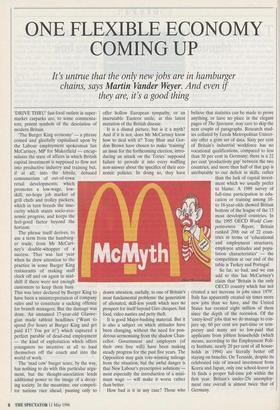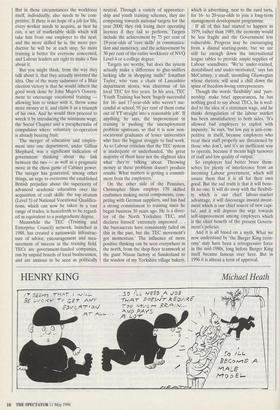ONE FLEXIBLE ECONOMY COMING UP
`DRIVE THRU' fast-food outlets in super- market carparks are, to some commenta- tors, potent symbols of the desolation of modern Britain.
The phrase itself derives, to use a term from the hamburg- er trade, from Mr McCart- ney's double-whopper of a success. That was last year when he drew attention to the practice in some Burger King restaurants of making staff clock off and on again in mid- shift if there were not enough customers to keep them busy. This was later declared by Burger King to have been a misinterpretation of company rules and to constitute a sacking offence for branch managers. But the damage was done. An unnamed 17-year-old Glaswe- gian made tabloid headlines (Want to spend five hours at Burger King and get paid £1? You got it!') which captured a perfect parable of dead-end employment — the kind of exploitation which offers youngsters no incentive at all to haul themselves off the couch and into the world of work.
The 'mad cow' burger scare, by the way, has nothing to do with this particular argu- ment, but the thought-association lends additional power to the image of a decay- ing society. In the meantime, our competi- tor nations race ahead, pausing only to offer hollow European sympathy, or an inscrutable Eastern smile, at this latest mutation of the British disease.
It is a dismal picture, but is it a myth? And if it is not, does Mr McCartney know how to deal with it? Tony Blair and Gor- don Brown have chosen to make 'training' an issue for the forthcoming election, intro- ducing an attack on the Tories' supposed failure to provide it into every waffling non-answer about the specifics of their eco- nomic policies. In doing so, they have drawn attention, usefully, to one of Britain's most fundamental problems: the generation of alienated, skill-less youth which sees no prospect for itself beyond Giro cheques, fast food, video nasties and petty theft.
It is good Major-bashing material. But it is also a subject on which attitudes have been changing, without the need for pon- derous sermonising from the shadow Chan- cellor. Government and employers (of their own free will) have been making steady progress for the past five years. The Opposition may gain vote-winning mileage from the situation, but the awful danger is that New Labour's prescriptive solutions most especially the introduction of a mini- mum wage — will make it worse rather than better.
How bad is it in any case? Those who So far, so bad, and we can add to this Ian McCartney's claim that 'Britain is the only OECD country which has not created a net increase in jobs since 1979'. Italy has apparently created six times more new jobs than we have, and the United States has created eight million of them since the depth of the recession. Of the `entry-level' jobs that we do manage to con- jure up, 60 per cent are part-time or tem- porary and many are so low-paid that applicants from jobless households (which means, according to the Employment Poli- cy Institute, nearly 20 per cent of all house- holds in 1994) are literally better off staying on benefits. On Teesside, despite its celebrated tide of inward investment from Korea and Japan, only one school-leaver in 16 finds a proper full-time job within the first year. Britain's under-25s unemploy- ment rate overall is almost twice that of Germany. But here the statistics tell us something slightly less depressing. Britain's youth unemployment rate, at 15.7 per cent, is actually five points better than the Euro- pean average, and less than half the com- bined rate of France, Italy and Spain. The way in which our entry-level job market operates may be open to all sorts of hos- tile criticisms, but at least it has the merit of flexibility. Yet another OECD survey in July 1995 reported that 'wide distribu- tion of working hours, low strike activity, ease of hiring and firing, wider wage dif- ferentials according to skill classifications and greater wage variations across regions' had all helped to reverse the trend in Britain's jobless numbers, which have fallen by 750,000 since they peaked in December 1992.
And what is fundamentally wrong, we may ask, with low-paid, casual work for teenagers, so long as it is honestly offered and carries the possibility of leading to something better? One person in eight in the American workforce received his or her first pay-packet from McDonald's. A cal- low youth employed to pack shoppers' pur- chases into plastic bags in Tesco learns, at the very least, something about punctuality, tidiness, co-operation with fellow workers and dealing with customers, and he is not vandalising telephone boxes or living off the taxpayer in the meantime. At Burger King, 60 per cent of branch managers in the London area have worked their way up from the lowest grade of counter staff, learning first about food hygiene and later about 'food cost, management of loss con- trol, staff development, restaurant finance, retailing and management skills'.
So it is a good thing that jobs are being created at the bottom of the ladder, and it is not in itself a bad thing that the lowest grade of assembly-line work in a Korean- owned plant in the north-east of England may attract less than £3 per hour, below the equivalent rate in Korea. If it were more, the owners would just carry on assembling their microwave ovens in the suburbs of Seoul, or commission a factory in Turkey.
That is a good argument, but not a suffi- cient one. Let us call into the pulpit at this stage Will Hutton, now editor of the Observer, to preach his gospel of a '30/30/40 society'. In this deeply gloomy analysis, only 40 per cent of the population can hope to rely in future on breadwinners with securely tenured jobs, while the 30 per cent at the bottom are more or less permanently `marginalised and economically inactive'. The slice in the middle may find work, but it is likely to be short-term or part-time, with minimal statutory protection. Whether or not Hutton's figures are accurate, the picture he paints of a rising tide of insecuri- ty — the most significant social develop- ment in 1990s Britain — has a lot of truth in it.
In our present economic structure, inse- curity and competitiveness are two sides of the same coin: the more insecure the work- force, the more competitive the employer companies will be — and therefore, in a perfect free-market world, the more pros- perous we should all eventually become.
`You really hear some tired pick-up lines on this job.' But in those circumstances the workforce itself, individually, also needs to be com- petitive. If there is no hope of a job for life, every worker needs to acquire, as best he can, a set of marketable skills which will take him from one employer to the next; and the more skilled he is, the more pro- ductive he will be at each stop. So more training is better for everyone concerned, and Labour leaders are right to make a fuss about it.
But you might think, from the way they talk about it, that they actually invented the idea. One of the many sadnesses of a Blair election victory is that he would inherit the good work done by John Major's Govern- ment to encourage vocational training allowing him to tinker with it, throw some more money at it, and claim it as a triumph of his own. And he would then proceed to wreck it by introducing the minimum wage, the Social Chapter and a paraphernalia of compulsion where voluntary co-operation is already bearing fruit.
The merger of education and employ- ment into one department, under Gillian Shephard, was a significant indication of government thinking about the link between the two — as well as a pragmatic move in the chess game of Cabinet power. The merger has generated, among other things, an urge to overcome the established British prejudice about the superiority of advanced academic education over the acquisition of craft skills: the top stratum (Level 5) of National Vocational Qualifica- tions, which can now be taken in a vast range of trades, is henceforth to be regard- ed as equivalent to a postgraduate degree.
Meanwhile the TEC (Training and Enterprise Council) network, launched in 1988, has created a nationwide infrastruc- ture of advice, encouragement and mea- surement of success in the training field. TECs are government-funded companies, run by unpaid boards of local businessmen, and are anxious to be seen as politically neutral. Through a variety of apprentice- ship and youth training schemes, they are competing towards national targets for the year 2000; they risk losing their operating licences if they fail to perform. Targets include the achievement by 75 per cent of 19-year-olds of 'core skills' in communica- tion and numeracy, and the achievement by 30 per cent of the entire workforce of NVQ Level 4 or a college degree.
Targets are worthy, but does the system actually make a difference to glue-sniffers lurking idle in shopping malls? Jonathan Taylor, who runs a chain of Lancashire department stores, was chairman of his local TEC for five years. In his area, TEC Youth Training has been 'hugely successful for 16- and 17-year-olds who weren't suc- cessful at school; 95 per cent of them come out of YT straight into a reasonable job'. If anything, he says, the improvement in training is pushing the unemployment problem upstream, so that it is now non- vocational graduates of lesser universities who face the biggest struggle to find work. As to Labour criticism that the TEC system is inadequate or underfunded, 'the great majority of them have not the slightest idea what they're talking about. Throwing money at these problems doesn't produce results. What matters is getting a commit- ment from the employers.'
On the other side of the Pennines, Christopher Shaw employs 170 skilled craftsmen making metal components, com- peting with German suppliers, and has had a strong commitment to training since he began business 30 years ago. He is a direc- tor of the North Yorkshire TEC, and declares himself 'extremely impressed . . . the bureaucrats have consistently failed on this in the past, but the TEC movement's got momentum.' The influence of more positive thinking can be seen everywhere in the north, from the shop-floor teamwork at the giant Nissan factory at Sunderland to the window of my Yorkshire village bakery, which is advertising, next to the curd tarts, for 16- to 20-year-olds to join a long-term management development programme.
If all of this had started to happen in 1979, rather than 1989, the economy would be less fragile and the Government less vulnerable. Progress may be encouraging from a dismal starting-point, but we are still far enough down the international league tables to provide ample supplies of Labour soundbites. 'We're under-trained, destabilised and under-motivated,' says Ian McCartney, a small, unsmiling Glaswegian whose rhetoric will send a chill down the spine of freedom-loving entrepreneurs.
Though the words 'flexibility' and 'part- nership' make brief appearances, he has nothing good to say about TECs, he is wed- ded to the idea of a minimum wage, and he thinks deregulation of the labour market has been unsatisfactory to both sides. 'It's allowed bad employers to exploit with impunity,' he says, 'but low pay is anti-com- petitive in itself, because employers who treat their staff properly are threatened by those who don't, and it's an inefficient way to operate, because it means high turnover of staff and low quality of output.'
So employers had better brace them- selves for plenty of interference from an incoming Labour government, which will assure them that it is all for their own good. But the sad truth is that it will bene- fit no one. It will do away with the flexibili- ty which is our chief labour-market advantage, it will discourage inward invest- ment which is our chief source of new capi- tal, and it will depress the urge towards self-improvement among employers which is the chief benefit of the present Govern- ment's policies.
And it is all based on a myth. What we now understand by 'the Burger King econ- omy' may have been a retrogressive force in the mid-1980s, long before Burger King itself became famous over here. But in 1996 it is almost a term of approval.




































































 Previous page
Previous page